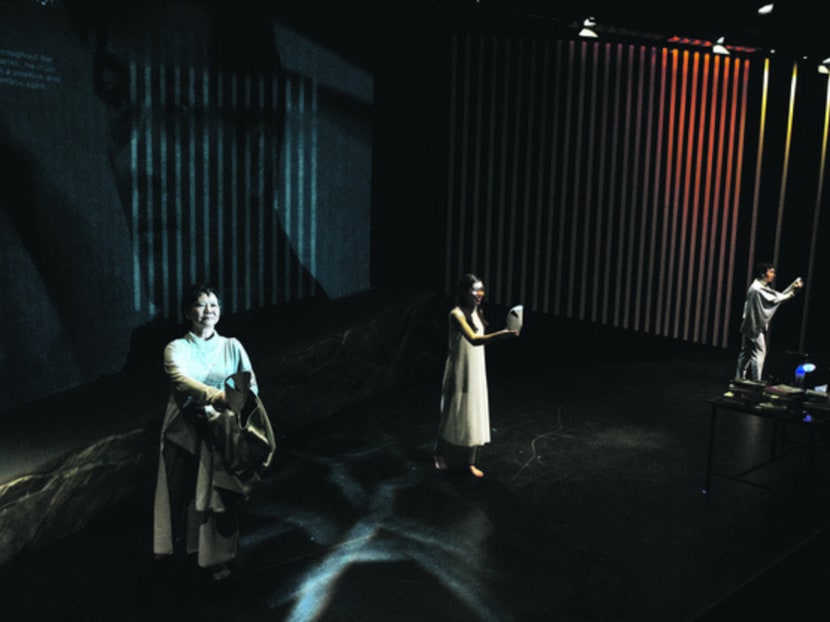Theatre review: Upstage: Contemplating 50 Years Of Singapore Mandarin Theatre
SINGAPORE — In between the restagings of two landmark Mandarin theatre musicals (Titoudao and December Rains) for its 25th anniversary season, Toy Factory has quietly sneaked in an unassuming little piece that’s big in scope and heart: A precious black box show about half a century of Mandarin theatre in Singapore.

In Upstage, Toy Factory looks at 50 years of Mandarin theatre in Singapore. Photo: Esplanade.
SINGAPORE — In between the restagings of two landmark Mandarin theatre musicals (Titoudao and December Rains) for its 25th anniversary season, Toy Factory has quietly sneaked in an unassuming little piece that’s big in scope and heart: A precious black box show about half a century of Mandarin theatre in Singapore.
Director Goh Boon Teck and playwright Cheow Boon Seng’s meta-theatrical Upstage, created in collaboration with The Esplanade, is presented as a docudrama play-within-a-play: A theatre company is celebrating its 50th anniversary and the director is holding an audition for actors even as he is still undecided on what play to use.
And just like Upstage’s Chinese title Baidu, which means “to ferry across the river”, we’re taken on a journey — through performed excerpts of nine works from the five decades, archival photographs, and video and archive interviews of theatremakers, bureaucrats and critics. In some ways, you could say it’s the Mandarin theatre scene’s counterpart to Rant & Rave, The Finger Players’ tribute to Singapore’s English language theatre scene. But one difference is how Upstage also incorporates voices from the periphery: It includes interviews of behind-the-scenes heroes such as a theatre electrician and a stage transport driver.
It’s a crucial inclusion because it underscores Mandarin theatre’s roots in Singapore as a people’s theatre, its ups and downs closely intertwining with the nation’s politics and audiences in ways that its English language counterpart could not.
Kuo Pao Kun’s towering presence is underscored not only by the selection of excerpts from four plays — including Descendants Of The Eunuch Admiral and Lao Jiu — but also by his consistently pivotal role as the decades rolled on. However, Upstage is a portrait not of a man but of a scene with other players. We get a glimpse of Mandarin theatre’s leftist leanings in 1966’s The Tune Of Life by the Kong Heh Musical Association, an overly dramatic play about relations between social classes. But Mandarin theatre was also employed in the People’s Action Party’s nation-building efforts: 1967’s The Return emphasises a former activist detainee’s integration into society — appropriating the aesthetics of Maoist theatre made popular during what was then the ongoing Cultural Revolution in China. The Mandarin theatre scene’s prickly relationship with Singapore authority is evoked elsewhere: Upstage refers to the 1976 wave of arrests for supposed communist activities, for which theatremakers like Kuo were also detained. Decades later, Drama Box’s The VaginaLOGUE would also run into funding issues because of reactions to its supposedly controversial content.
Other facets are also explored in Upstage, such as the scene’s more glorious moments (there were 20 Chinese theatre groups in 1975 while various groups collaborated to stage Oolah World in 1984), its seeming decline in the face of a growing English language theatre scene in the ’90s (interestingly enough, with Kuo himself playing a huge role in its development), and how it caught its second wind with a wave of new (often bilingual) groups to carry the torch.
Even as we’re walking down memory lane, Upstage likewise holds a mirror up to the scene with the performers taking on archetypal roles: Jalyn Han as the veteran actress who’s seen it all, Yeo Kok Siew as the know-it-all mid-career actor, Jodi Chan as the emerging but irresponsible young talent and Lim Ngian Tong as the gentle, prodding director. The latter could very well stand in for Kuo and, in fact, figures in the show’s most haunting and gorgeous moment: A soliloquy from Descendants of the Eunuch Admiral as multimedia designer Ong Kian Peng’s hypnotic digital waves engulf the stage.
Behind all of Upstage’s history are some soul-searching questions: About the relevance of old plays, just how professional the scene is and the stigma attached to theatre actors. Without changing the hopeful, celebratory tone of the play, these questions are subtly raised, important and current ones that add complexity to this much-deserved take-stock onstage event.
After going through so much, Singapore’s rich Mandarin theatre scene perseveres — more than anything else, it’s this enduring spirit that Upstage captures.
Upstage runs until Sunday, 3pm and 8pm, at the Esplanade Theatre Studio. Tickets at S$30 from SISTIC.







